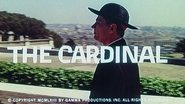RanchoTuVu
This film seems to convincingly portray the inner workings of the Church in its central story of the rise of a newly ordained priest to the rank of cardinal. It has some excellent dialogue among the leaders of the Church that could strike some as stiff but actually reveals a deft combination of mutual respect under which lies Machiavelian diplomacy. The Vatican scenes are exquisitely detailed, with a keen eye to Church politics and ambition disguised behind very well delivered dialogues of diplomacy. The film is a historical dramatization that begins in Rome with Tom Tryon's ordainment as a priest just as World War 1 is about to begin and comes to an end as Tryon, now a bishop, is in immediate post-Anschluss Austria as the Nazis lead violent anti-Catholic riots. His part is very well played throughout, capturing the trials he faces with his family life in Boston as well as his strong convictions to uphold the teachings of the Church, especially when they conflict with political realities. This is a dense film.
TheLittleSongbird
I quite like Otto Preminger's work, which has consisted of some masterpieces(Laura), some great movies(Carmen Jones), some underrated curiosities(Under Your Spell) to decent and interesting(this). So far, my least has been River of No Return, and even that was nowhere near close to awful.I found The Cardinal to be interesting and a very decent little movie. It isn't entirely successful however, the film is lengthy and does feel overlong and stodgy in places, Tom Tryon's lead performance is rather stiff and when I saw The Cardinal, the sound seemed muffled.However it is a well made movie, with beautiful locations and photography, and the music score is highly emotional. Preminger directs with his usual efficiency, the script has many moments of thoughtfulness and the story is crafted in a loving and careful manner and asks several questions which is a further point of interest. To make up for Tryon, we do have a great supporting cast, especially Burgess Meredith and John Huston who are both wonderful. And the scene with Meredith dying and Huston visiting him was beautifully done.In conclusion, an interesting film. 7/10 Bethany Cox
GrigoryGirl
I'm not a major fan of Otto Preminger's work. I find much of his work too long and self important. But I was wonderfully surprised at how much I loved this film, and now it's my favorite Otto Preminger film.This is a wonderful film. It's moving, complex, literate, articulate, and surprisingly thought provoking. The subjects it tackles are still relevant today. The subject of faith, entering the priesthood, sacrifice to God, dealing with abortion, sex, racism, and church leaders and their dealings with politics are issues that haven't gone away, and Preminger handles them quite well without resorting to melodrama and sledgehammer points.The Cardinal moves along at a beautiful pace, and it feels like a grand novel, leisurely, but enthralling. Out of the entire film, there is maybe one or two scenes that are superfluous and could have been cut (the inclusion of a song in a vaudeville theater is one of them), but overall, all the scenes here are valid and tell the story. The film's dialogue is excellent, quite literate and intelligent. The film's score is very subtle, and it's never used as a cue on how to make the viewer feel. In fact, most of the scenes have no music.Preminger's mise en scene has never been better. His framing is immaculate, using long takes extremely well, giving the literate dialogue extra weight by making the viewer really concentrate. Quite often, too much cutting simplifies things, but luckily, Otto avoids that. The cinematography and the production design are magnificent. The film reminded me of, surprisingly, Luchino Visconti's The Leopard. Not in the story (Visconti's film was about the unification of Italy as seen through the eyes of an aristocratic family), but in the production design (which is sumptuous in both The Leopard and The Cardinal), framing, cinematography, and beautiful performances.Tom Tryon, a relative unknown here, is quite good as The Cardinal. He's in nearly every scene and he holds his own very well. Many found him boring, or as least too stoic, but I thought he was pretty damn near perfect. John Huston is great as a cranky but caring Bishop, Burgess Meredith is excellent as a dying priest, and Ossie Davis is great as a black Catholic priest. The scene in which Tryon confronts a racist town where Davis's parish resides is one of the most powerful scenes in the entire film. The film has an abortion scene (which was shocking for 1963, when the film was made), and it's still incredibly powerful and uncomfortable to watch. Some of the film is dated (mostly attitudes about marriage and social mores), but most of it is still valid today.The film is not as deep, mystical, or as intellectual as a Tarkovsky, Bergman, or de Oliveira film, but it comes surprisingly close, and it doesn't have the usual Preminger manufactured controversy. Here he doesn't do that, and makes what I believe is, if not his best film, certainly his most underrated. I recommend this film highly.



